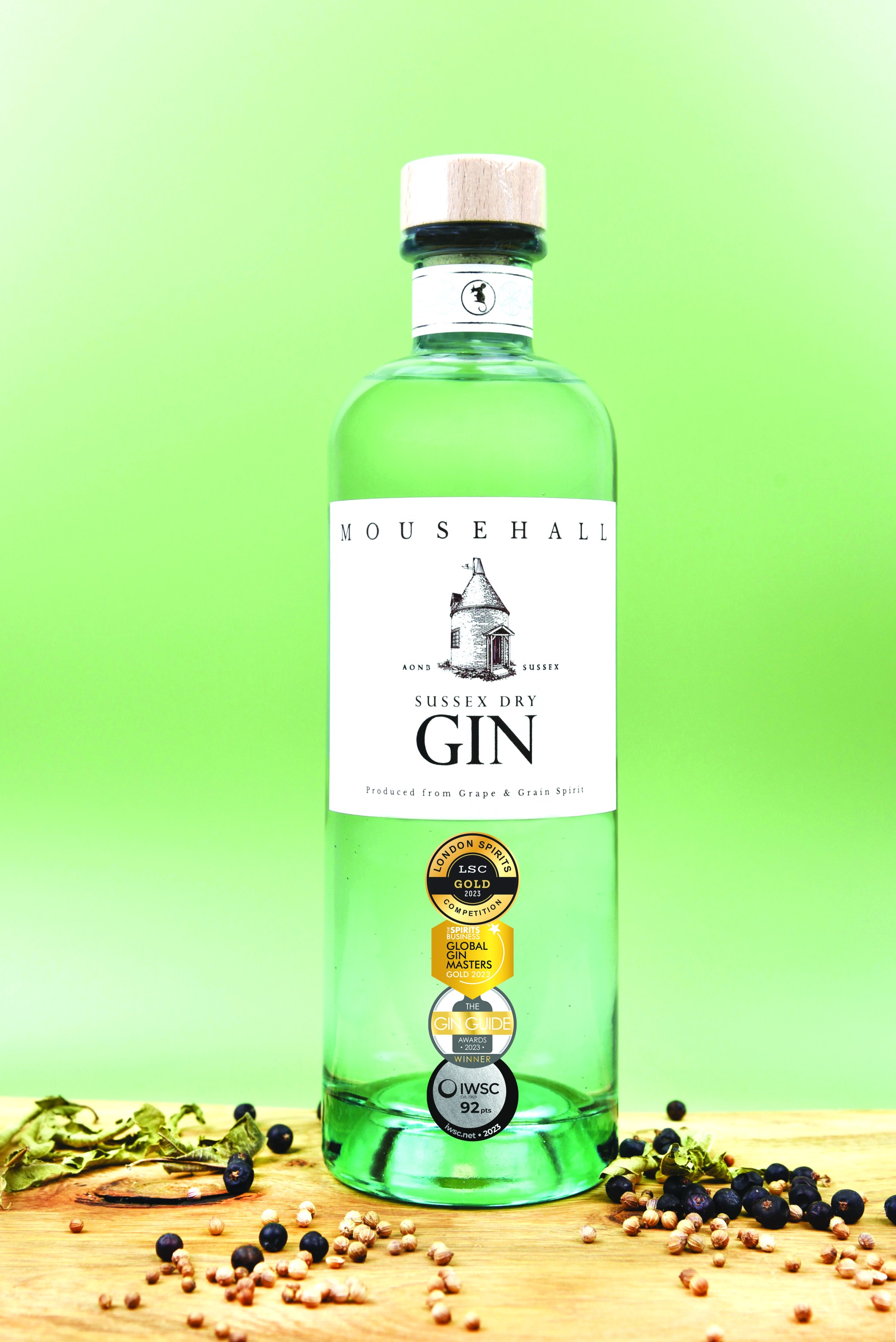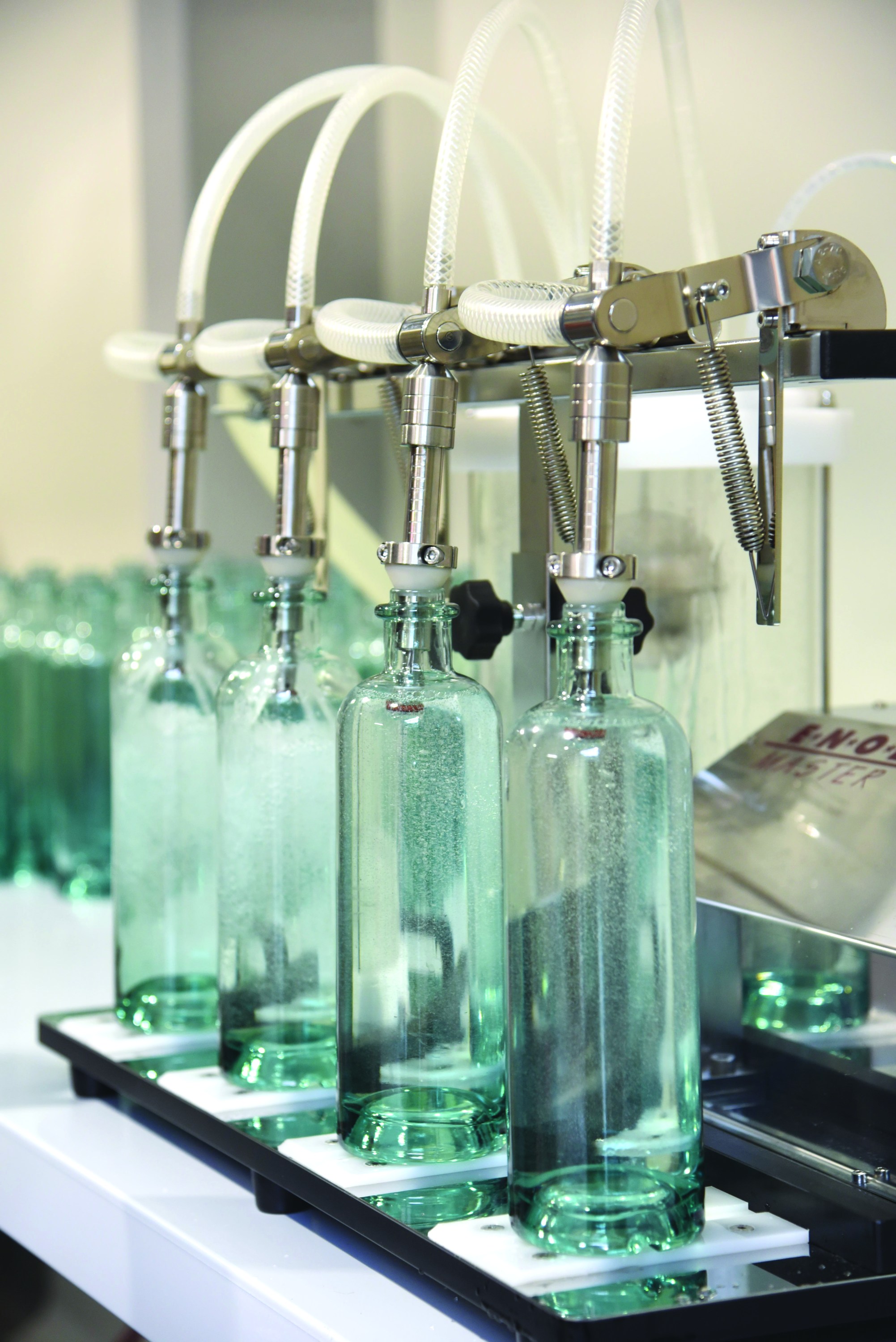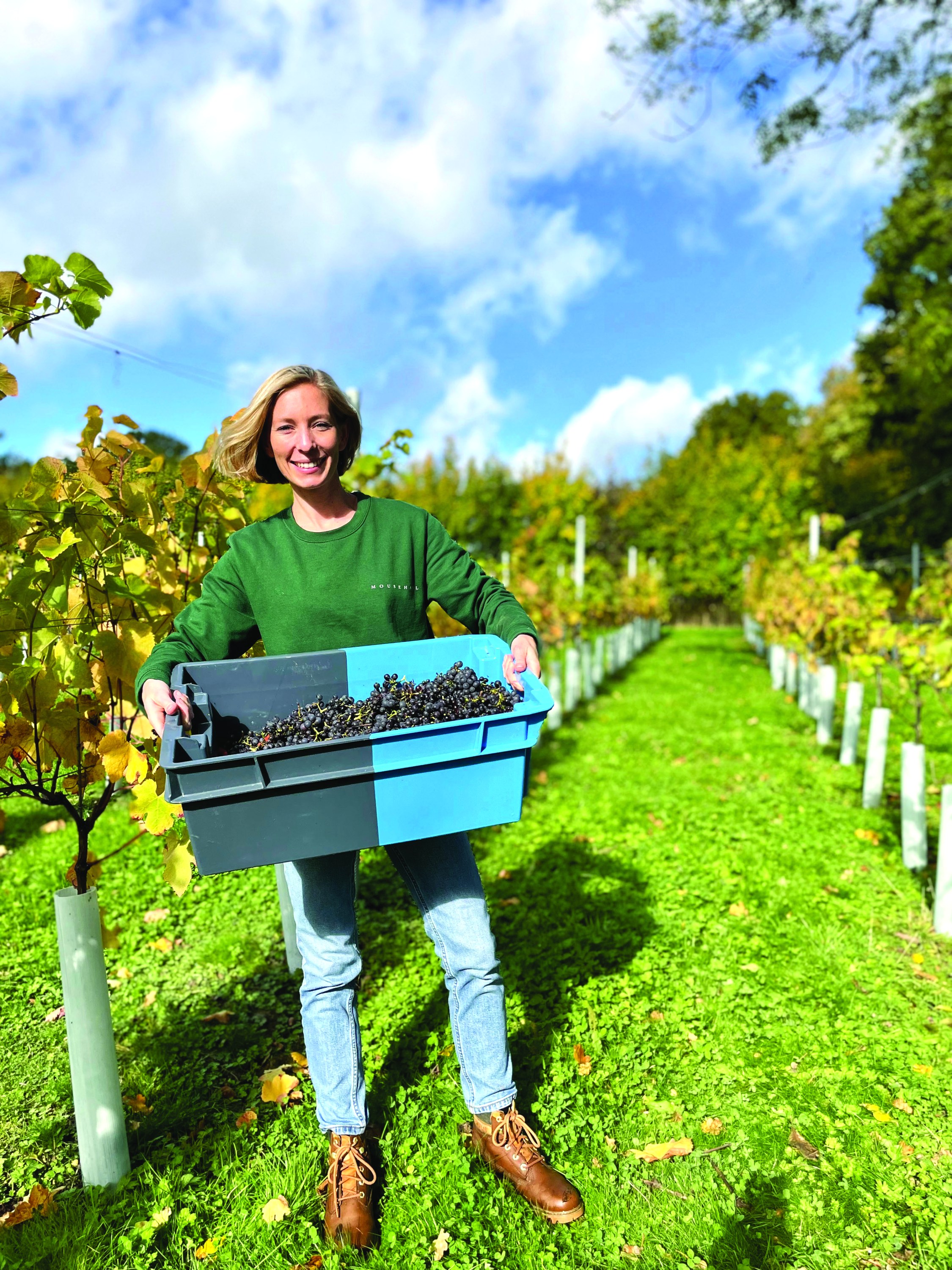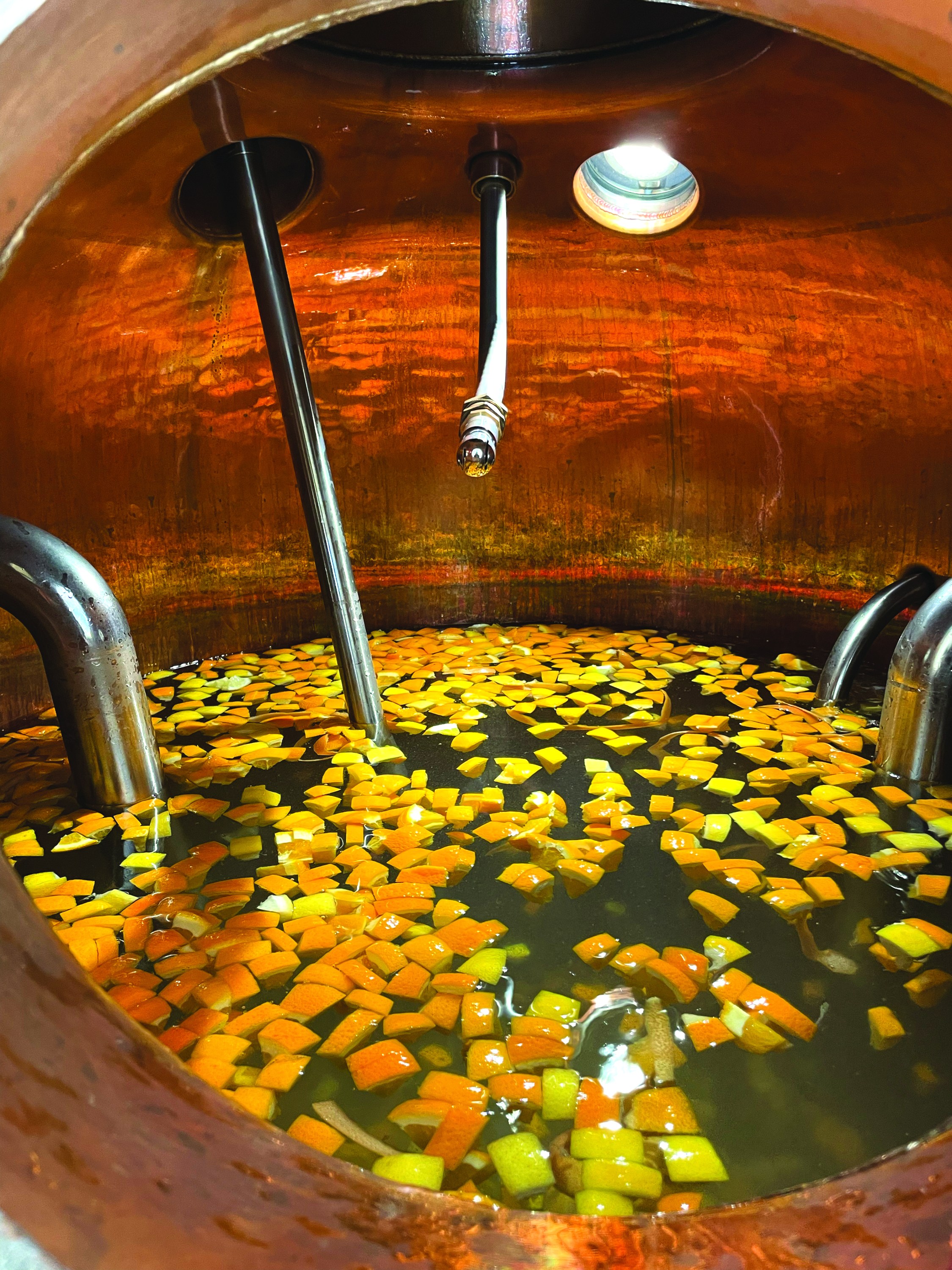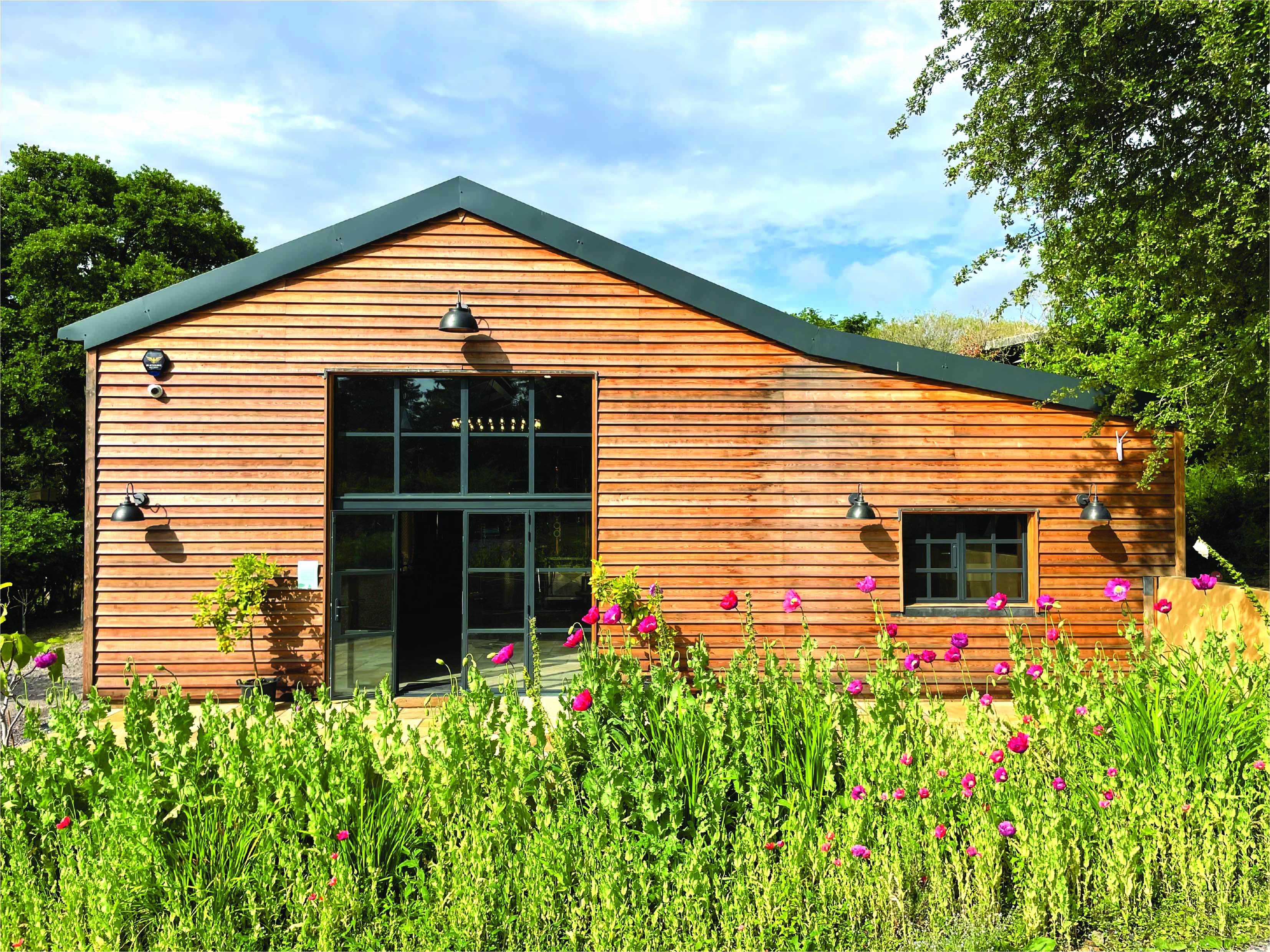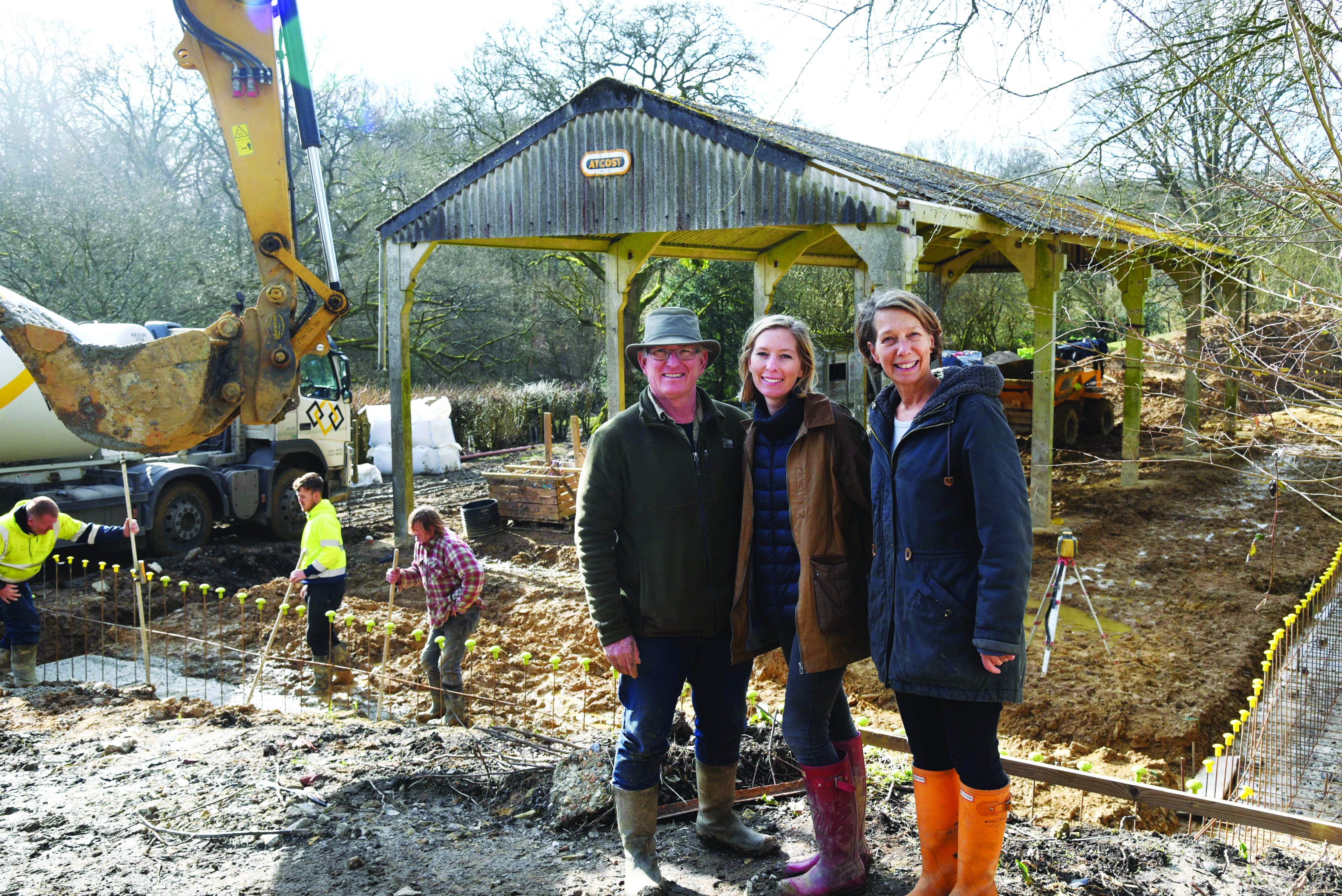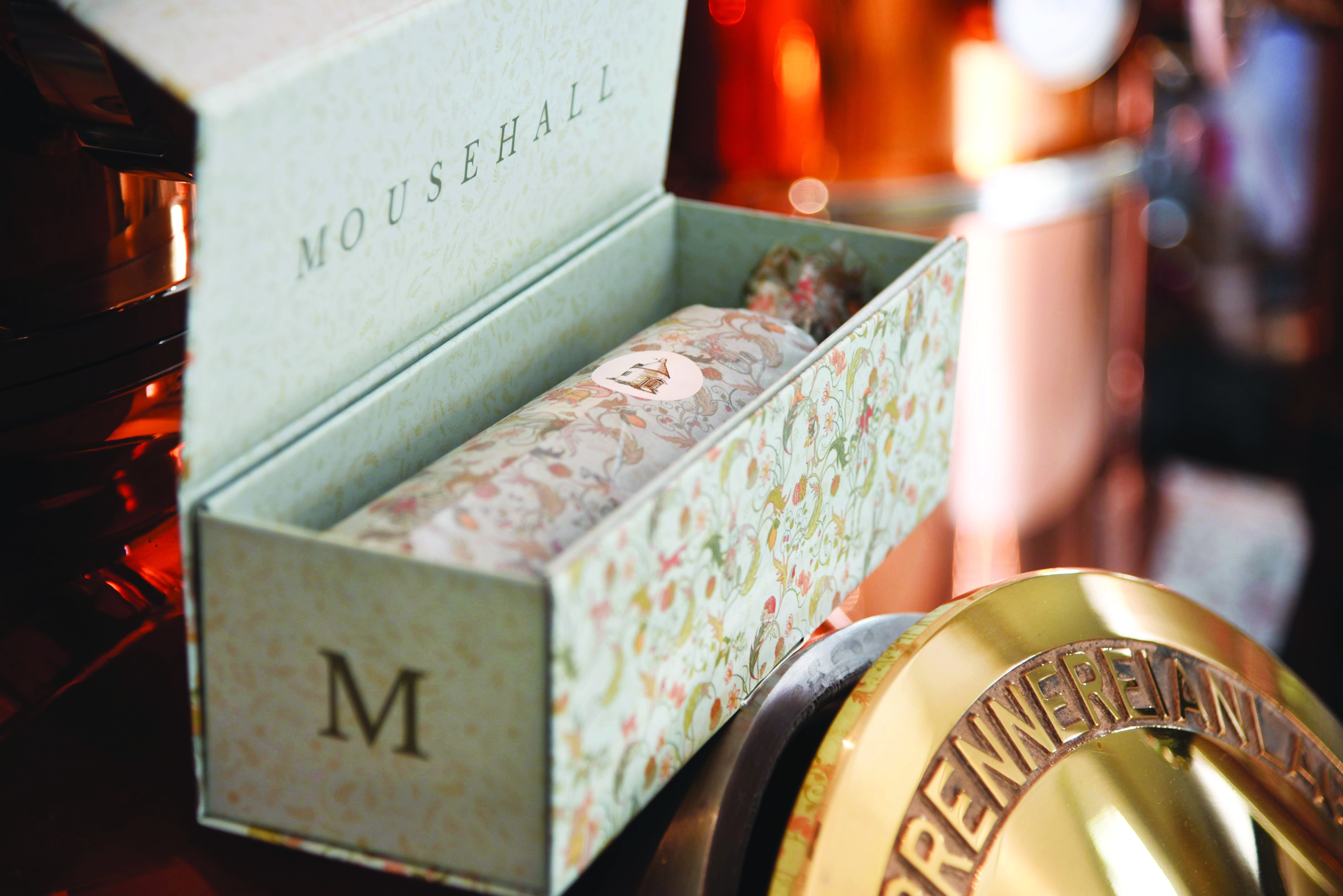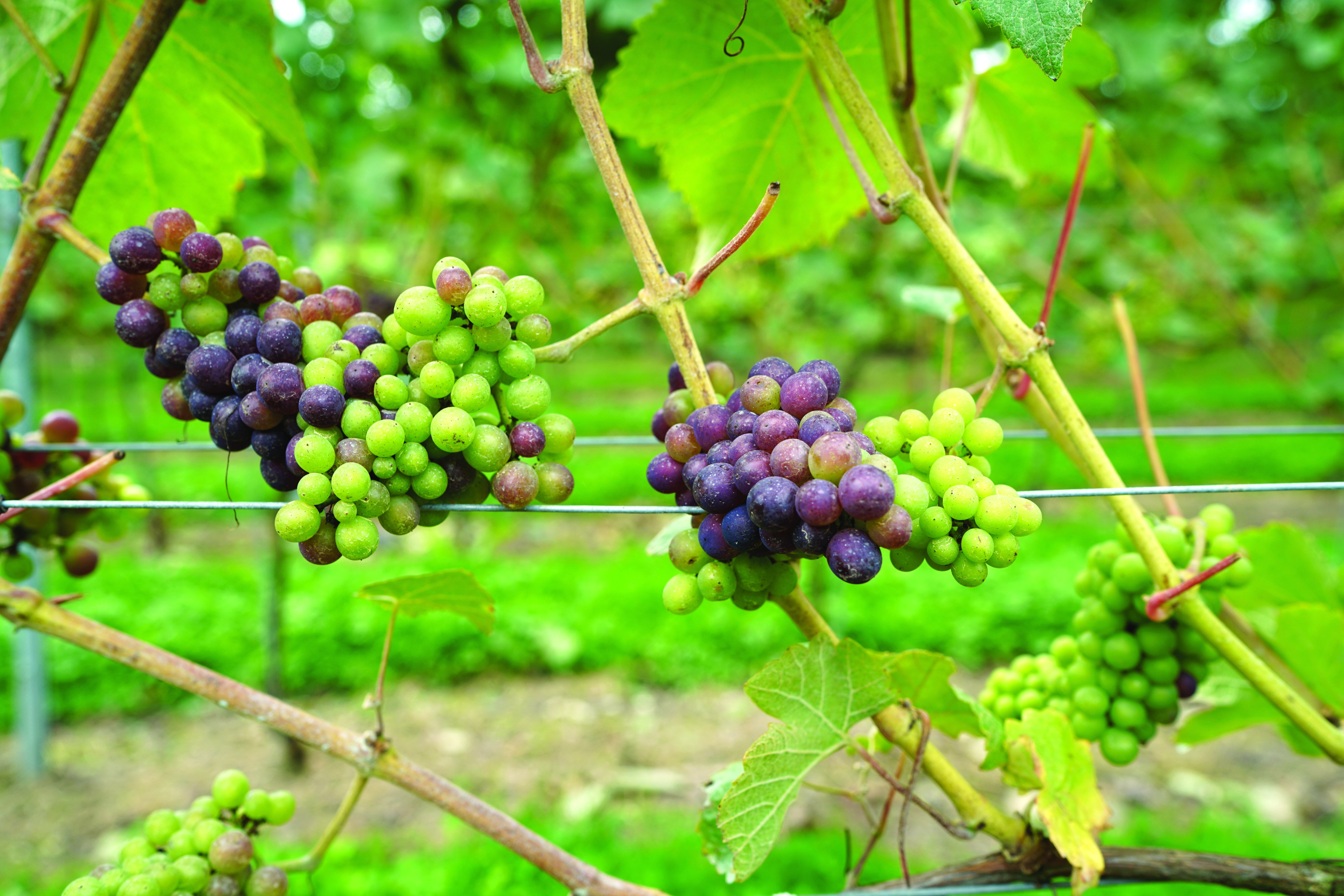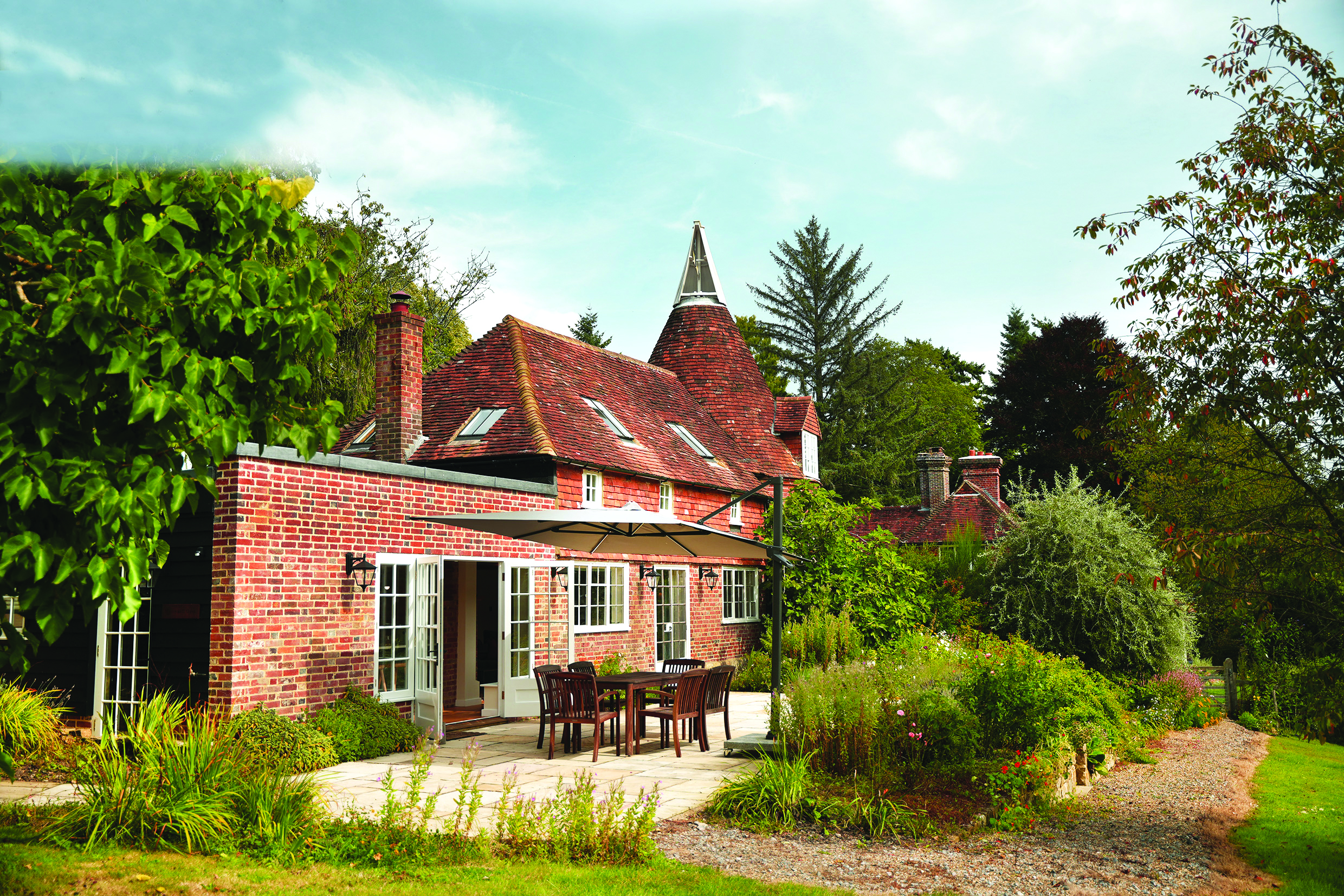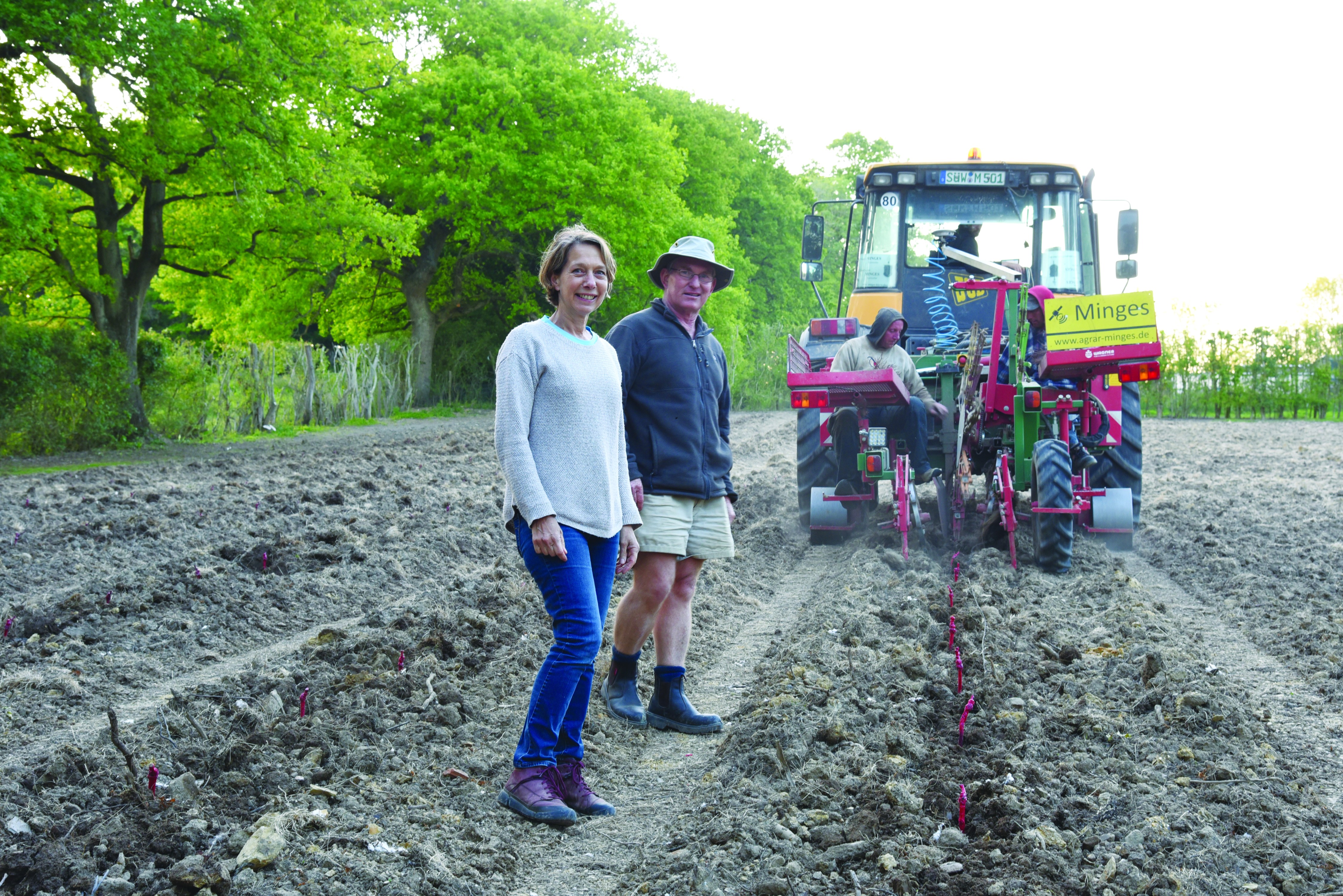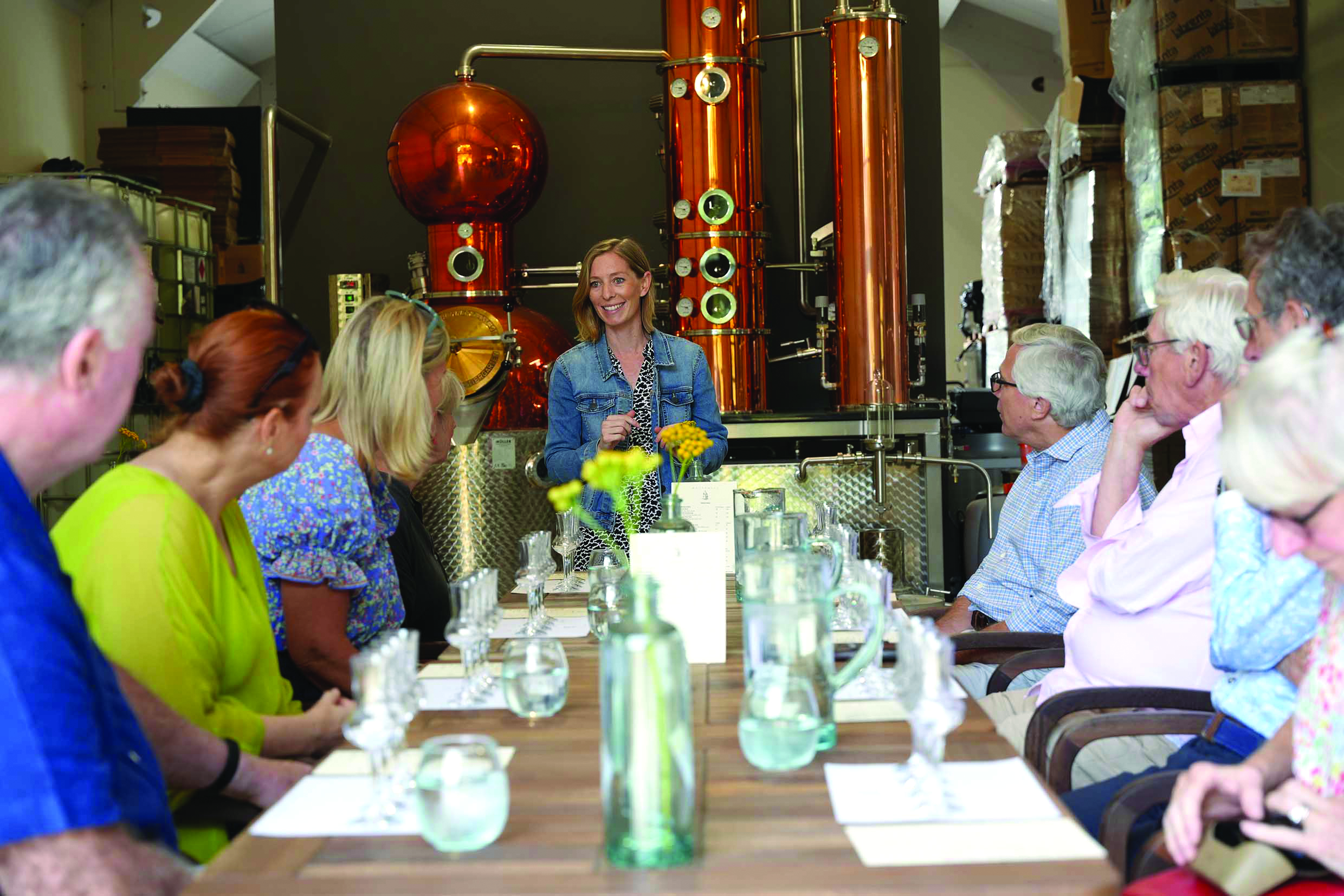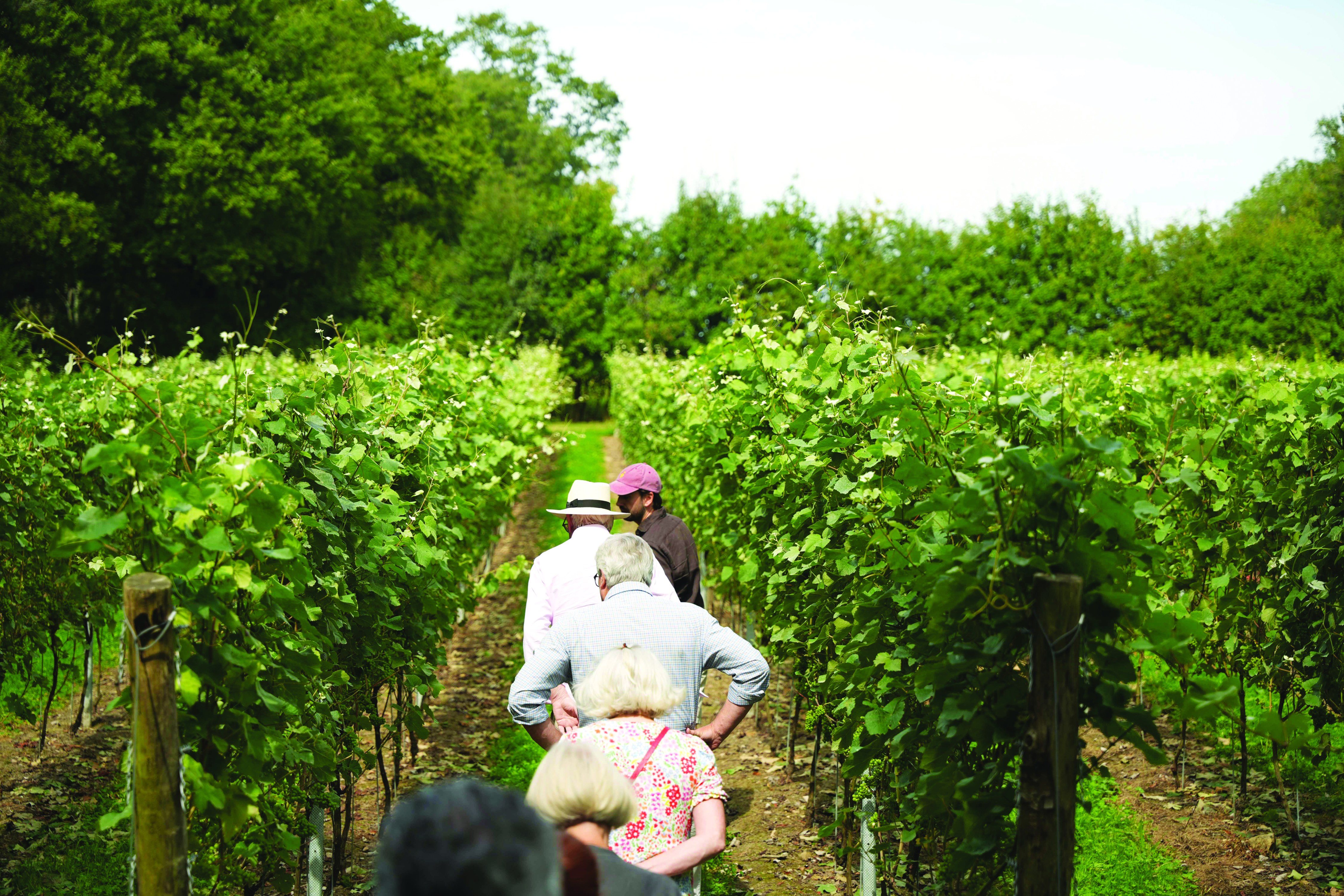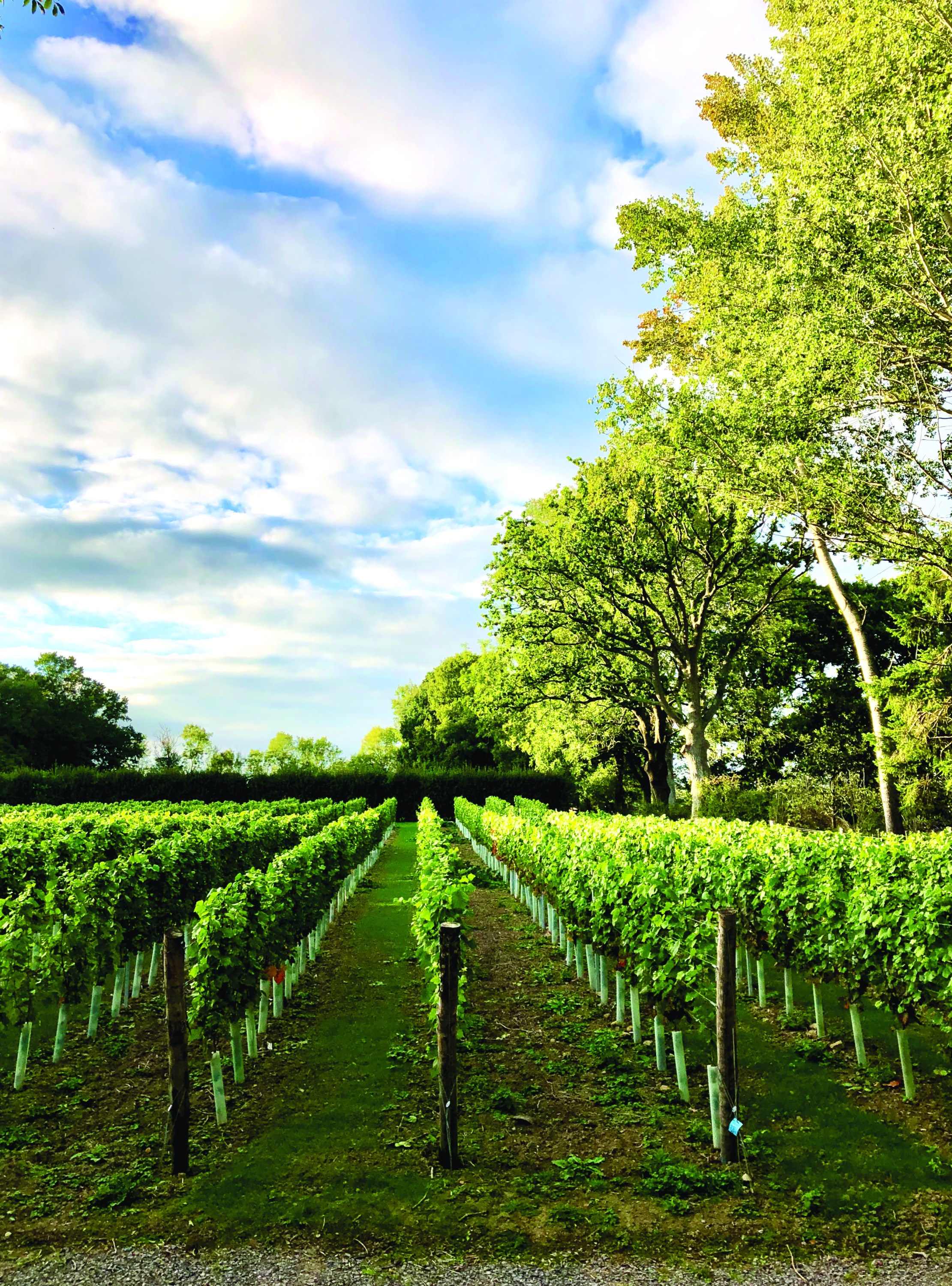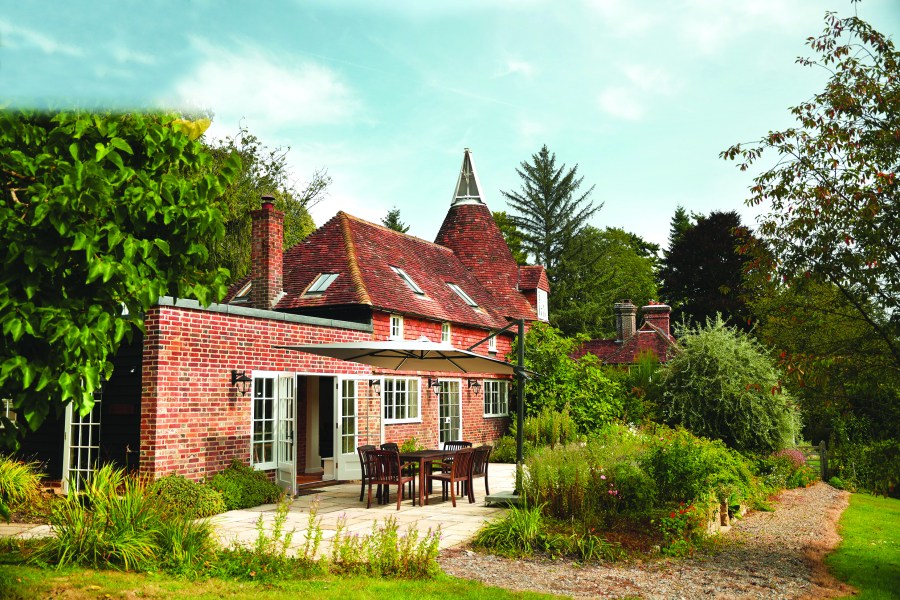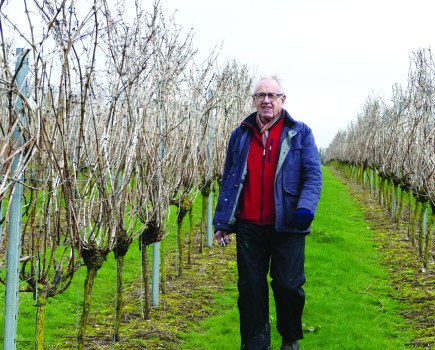Guest writer Nigel Akehurst visited Mousehall, a family-run, sustainable distillery and winery nestled in the scenic High Weald National Landscape near Wadhurst to discover how the Jordan family has transformed the historic country estate into an award-winning wine and spirits business.
Turning off Tidebrook lane, I followed a gravel track, passing several pretty houses before encountering a small flock of distinctive, black-headed Dorper rams grazing on a steep field. A beautiful Wealden farmhouse and oast greeted me at the entrance to Mousehall, and taking a right turn I followed the track along the bottom of the vineyard, arriving at the visitors’ car park.
I headed for a large modern barn housing Mousehall’s Distillery and Winery, where I met Christy Jordan and Nick Siersema. Invited in to the impressive, double height space, the first thing I noticed was the shiny, 400 litre copper pot still Amahle (meaning “the beautiful one” in several African languages) taking centre stage.
As we sat down for a chat, Nick fired up their impressive barista machine and brewed us all a proper cup of coffee. I was eager to learn more about the estate, and Christy explained how her parents, Gary and Kathy Jordan, had bought the 14 acre property at the end of 2017.
Wine background and finding a suitable property in the UK
With a background in viticulture – they own the Jordan Wine Estate in South Africa – Gary and Kathy had decided they wanted to start a vineyard in the UK. The search was far from straightforward, added Christy, but after being shown many properties by various estate agents they were eventually shown Mousehall. It was neglected and overgrown, but the family fell in love with the historic buildings, and the south-facing slopes were ideal for vines.
Equipped with a chainsaw and brush cutter, the family got to work clearing the grounds in early 2018, simultaneously renovating the historic buildings and preparing the south-facing field for vine planting. After making drainage improvements in 2019, they contracted in VineWorks to plant vines growing the champagne varietals, Chardonnay, Pinot Noir and Pinot Meunier.
Seeing the vines being planted was impressive, commented Christy, describing how the GPS-guided tractor and machine and two men planted all the vines in a matter of hours.
That same year Christy joined her parents at Mousehall, moving over from South Africa to work on developing the gin business. In 2021 they converted a redundant Atcost barn into what is now their distillery and winery, one of the first such combinations in the UK.
The team now boasts six full-time members of staff, each with their own defined role, though they often overlap during busy times, such as during events and at harvest time, explained Christy.
No two days are the same, with Mousehall now offering distillery tours and tastings, private events and functions and luxury accommodation in the oast house. Nick joined Christy at Mousehall early last year to head up sales and finance after giving up his IT job in London and explained that he doesn’t miss looking at a screen all day long.
Barn renovation and setting up a distillery from scratch
A lot of work went into getting everything set up, and Christy said they ended up applying for 14 different licences for the business.
“Before 2009 it was virtually impossible to start a distilling business, due to rules that meant you couldn’t have a still holding less than 2,000 litres, which is industrial scale,” explained Christy. Thankfully Sipsmith managed to get a small-scale distillers’ licence and paved the way for the artisan gin boom.
Christy, who has a background in visual arts and worked in hospitality for a number of years, worked closely with her cousin, Lindy Wright, a graphic designer in South Africa to create the brand identity for Mousehall, incorporating a lot of the medieval history and nature of the estate into their beautiful packaging and website (www.mousehall.com)
With a growing demand for local artisanal gin, it made sense to set up a distillery and winery at the same time, especially as it takes a few years for the vines to grow and establish, she explained.
The family worked closely with local building firm AT Palmer to carry out the barn conversion and Oast renovation (now a luxury holiday let). Covid-19 put a bit of a spanner in the works with building supplies, so the barn was delayed, but they managed to get it completed just in time for the arrival of their German-made copper pot still in January 2022.
Christy described what she called an unforgettable moment when they travelled to the Black Forest in Germany to watch in awe as their copper still, crafted by fourth-generation coppersmiths and an essential piece of their distilling dreams, came to life.
Gin-making process
To make the gin they begin by buying in a 96% neutral spirit from a local supplier as their base alcohol.
They then add their own mixture of botanicals using a one-shot method. Christy explained they do four distillations to create their Mousehall Sussex Dry Gin and use 13 botanicals in total, including locally grown English coriander seed and Mousehall lavender. They are also growing various botanicals they will be using in their seasonal spirits and vermouth.
It took Christy about a month to perfect the recipe, playing back and forth with the different quantities and then adding an extra botanical here or there to ensure quality and depth of flavour.
“You can be quite creative,” she said, adding that she even tried distilling hay to experiment with different taste profiles (apparently it tastes quite sweet when distilled).
Spending a few months on developing their sustainable packaging, they launched their signature Mousehall Dry Gin in June 2022 to critical acclaim. The team then set its sights on expanding the product line, launching a Triple Distilled Fresh Citrus Vodka in June 2023 and an Elderflower Aperitif using hand harvested Mousehall Elderflowers. A further 250 trees have been planted to increase production. Scheduled for release later in 2025 is an Absinthe and a Mousehall Vermouth.
Showing me around the barn, Christy and Nick explained how they can use their impressive steel tanks for both spirits and wine making. Several Tidebrook sparkling wines were bottled in 2024 with the Sparkling Rosé due to be released in 2026. A Brut and a Blancs de Blancs are currently aging in bottle.
Tidebrook Wines
Finishing our tour inside, we headed out to see the vineyard and grounds. “The first grapes were harvested in 2022,” explained Christy. Their maiden vintages of still wines, named Tidebrook, after the hamlet the estate is located in were extremely well received and the name of this hamlet is now known further afield as the entire wine range is currently exported to Norway.
Gary and Kathy Jordan make a benchmark Burgundy style Chardonnay at Jordan Wine Estate in Stellenbosch, South Africa called ‘The Whole Nine Yards’. This wine has often won the Decanter or IWSC Chardonnay Trophy and requires a large % of new oak barrels each year. “Young vine English Chardonnay would be overpowered by new oak, so what we do is regularly ship a few used barrels with each shipment of our South African wine to the UK,” said Kathy. “Containers always have a weight restriction” explained Gary, “but as empty barrels weigh a negligible amount compared to bottled wine, we are able to fit a few barrels on top of the cartons of wine with each shipment. This way we are assured that the best barrels are chosen for our Staddle Stone Chardonnay and are specially pre-seasoned for their use with our Sussex grapes.”
With so much thought and experience the initial vintage of Staddle Stone Chardonnay 2022 won many awards including a Gold medal at the WineGB awards and was part of the Golden 50 at the Vineyard and Winery Show in November 2024. The name of the wine is inspired by the mushroom shaped stones that were used to support granaries and haystacks. A series of medieval staddle stones mark the boundary of the chardonnay planting at Mousehall.
Alongside the Staddle Stone Chardonnay there is also Tidebrook Six Petals Rosé 2023, a blend of Pinot Noir and Pinot Meunier with 12.5% alcohol. The wine was aged in tank for 10 months.
The Tipping Point is a 100% Pinot Noir wine aged in Burgundian oak and the newest release is Medieval Monk. Released in February 2025 and made with 100% Pinot Gris the grapes were hand harvested in 2023. “With Pinot Gris originally considered to be one of the most important grape varieties in medieval Burgundy, it made sense to look at areas where it is currently grown and considered to be a more serious, noble variety. Easily adapting to our Sussex growing conditions and ripening before Chardonnay (which is a plus in cool vintages), our Pinot Gris has complex aromatics and a great texture and flavour. There is no doubt that our Tidebrook Medieval Monk Pinot Gris will stand out proudly against worthy competitors in Alsace,” said Gary.
Walking through the rows of their picture-perfect vineyard, Christy explained that the mild, wet conditions had made 2024 a tricky year. As a result harvesting was delayed, even though they had been through and removed leaf cover to speed up ripening. Nick and Christy welcomed daughter Eloise earlier this year and harvest 2025 will be Eloise’s first experience of the family business.
“In a good year harvest would start at the end of September” said Christy.
Tips for aspiring vine growers
I asked Christy what advice she had for other farmers and growers who were considering diversifying into viticulture. She replied that it was easy to be romantic about starting a vineyard, but it was important to work out if the land was suitable for growing vines first. Ideally you need free-draining, south-facing slopes below 100m, she advised, adding that you may need to factor in deer fencing, especially if the site is located near woodland.
It’s a lot of hard work, she added, so you need to be sure you are passionate about wine, too. Planting vines is a considerable up-front investment, and you also need to factor in the ongoing maintenance. Other factors to think about include how you plan to market the grapes.
Dorper Sheep
Helping keep on top of the grassland management at Mousehall is a small flock of Dorper sheep, which graze under the vines during the winter season. The Dorper is a South African, self-shedding breed created by crossing a Persian ewe with a Dorset Horned ram, explained Christy.
Regenerative and sustainable farming practices include animals to naturally control grass and weed growth. “We also make our own compost and add some animal manure to that too. We plan to make biochar this year said Christy, which will help to revitalise the soil at Mousehall.
The flock has since grown in number and Christy knows all the 18 ewes by name, with no plans to do any more lambing at present. She said that anyone interested in buying pedigree Dorper rams should get in touch.
Mousehall guided tours and tasting experiences
With a growing demand for wine and spirits experiences, the Mousehall team offers distillery and winery tours and tastings every Wednesday, Friday and Saturday throughout the year. Guided tasting experiences cost from £30 per person. Mousehall also has increasing demand for private functions with Nick offering wood fired pizza’s for these events. Mousehall will also collaborate with external chefs to offer an exciting schedule of events throughout the summer.
With a growing number of vineyards in the High Weald, Mousehall is now part of the Wealden Wine Trail, launched to promote 12 vineyards open to the public.
Marketing and luxury oast accommodation
Marketing is a key part of their business strategy and both Christy and Nick are accomplished marketeers, having built a loyal following on Instagram (@mousehall_country_estate) and racked up nearly 4,000 followers so far.
Their content features everything from product news to updates from the estate, such as the recent addition of their newly renovated luxury oast accommodation that sleeps six. Showing me around, they pointed out the wood-fired hot tub in the garden.
With my visit drawing to an end, we walked through their extensive grounds, taking in their kitchen garden, gin garden and pear and apple orchards with gem squashes – a South African favourite – growing below.
Leaving Mousehall with a bottle of award-winning gin and vivid memories of their picturesque estate, I was struck by how the Jordan family and the team have transformed the property into a beacon of sustainable, artisanal craftsmanship – an inspiring example of what passion, dedication and vision can achieve.
Estate Facts
- Mixture of historic and modern buildings set within 14-acres.
- South-facing slopes under 100m, mainly clay and sandstone.
- Granted 14 different licences for the distillery and winery, including rectifying, spirit blending, gin and vodka.
- Renovated a redundant Atcost barn in 2021 to a high spec to house a 400L copper pot still and winery, receiving a LEADER rural grant to help cover some of the costs.
- Planted champagne varietals Chardonnay, Pinot Noir and Pinot Meunier in 2019 on half a hectare.
- Small flock of Dorper ewes and rams.
- Offer tours and tasting experiences.
- Luxury accommodation in a renovated oast house which sleeps six
